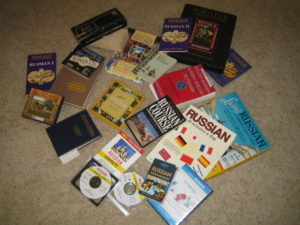That’s a hard question to answer. After nine years of mostly self-instruction, I suppose I can claim to have moved beyond the level of beginner. When I am brave enough to open my mouth and let the foreign words pour forth, Russians say I have a perfect accent and speak “good Russian.” Of course I do—it’s all memorized from the embarrassing plethora of language learning books, tapes and software I have acquired over the years. We’ve all heard the quip: you can never be too thin or too rich. But can someone have too many Russian courses? Take a look and let me know if I’ve fallen into obsession. Believe it or not, some programs are missing in action. I’ve misplaced them or loaned them to friends.

Experience has taught me that I am better off pretending I don’t speak–because I rarely understand. What good is asking a question if the answer is unintelligible? I do great with kids–they use simple words and speak slowly. Once I played UNO for hours with a 7 year old because I can count to ten and know the Russian words for red, blue, yellow, and green.
Nevertheless, each year I try to learn new vocabulary and improve my ability to grasp the Cyrillic alphabet so billboards and street signs are decodable. What I’ve learned is that about half the time they include “international” words that are also part of my native vocabulary–words such as: bank-o-mat, McDonalds, salad, hockey, drama, goose, metro, park, zoo, chocolate, and of course, vodka. This year I’m working through a program called “Linkword” – which connects Russian words with something in English that serves as a memory trigger. For instance, the Russian word for juice is сок (pronounced like sock). So…imagine drinking juice out of a sock. That mental image helps recall the word! Here’s another: the Russian word for cow is корова (pronounced like carova). Imagine a cow jumping OVER A CAR. Cool, huh?
The point of this post is just to give you the inside scoop on another dimension of my preparations. (Or, should I say dementia?) I spend about 5-10 hours per week refreshing my so-called skills and helping my “ear” retune itself to hearing Russian. In spite of my joking about it above, I really do use it and feel much more secure knowing I can communicate, even a little bit, when my English-speaking friends aren’t nearby–which is rarely.
True confession time: often I have prayed for a miracle…that God would grant me a supernatural ability to speak AND understand Russian when I’m in Samara. So far, His desire seems to be for me to keep working at it. I can do that.













I remember when you taught me to read Cyrillic and I discovered I could read “computer…”
I too had the basics down for our year in Samara. It was a survival skill so that I could shop!! and ask for the “blue” one, or “two of the blue ones.” After only being there for a couple of weeks I remember purposing to know how to say excuse me in Russian because I was constantly bumping into and stepping on feet of those on the crowded buses. However, during the course of my year there I realized this was a fairly unnecessary tool….the Russian people must think nothing of the bumping and stepping for they do not say ‘izzvenitia” to me!!